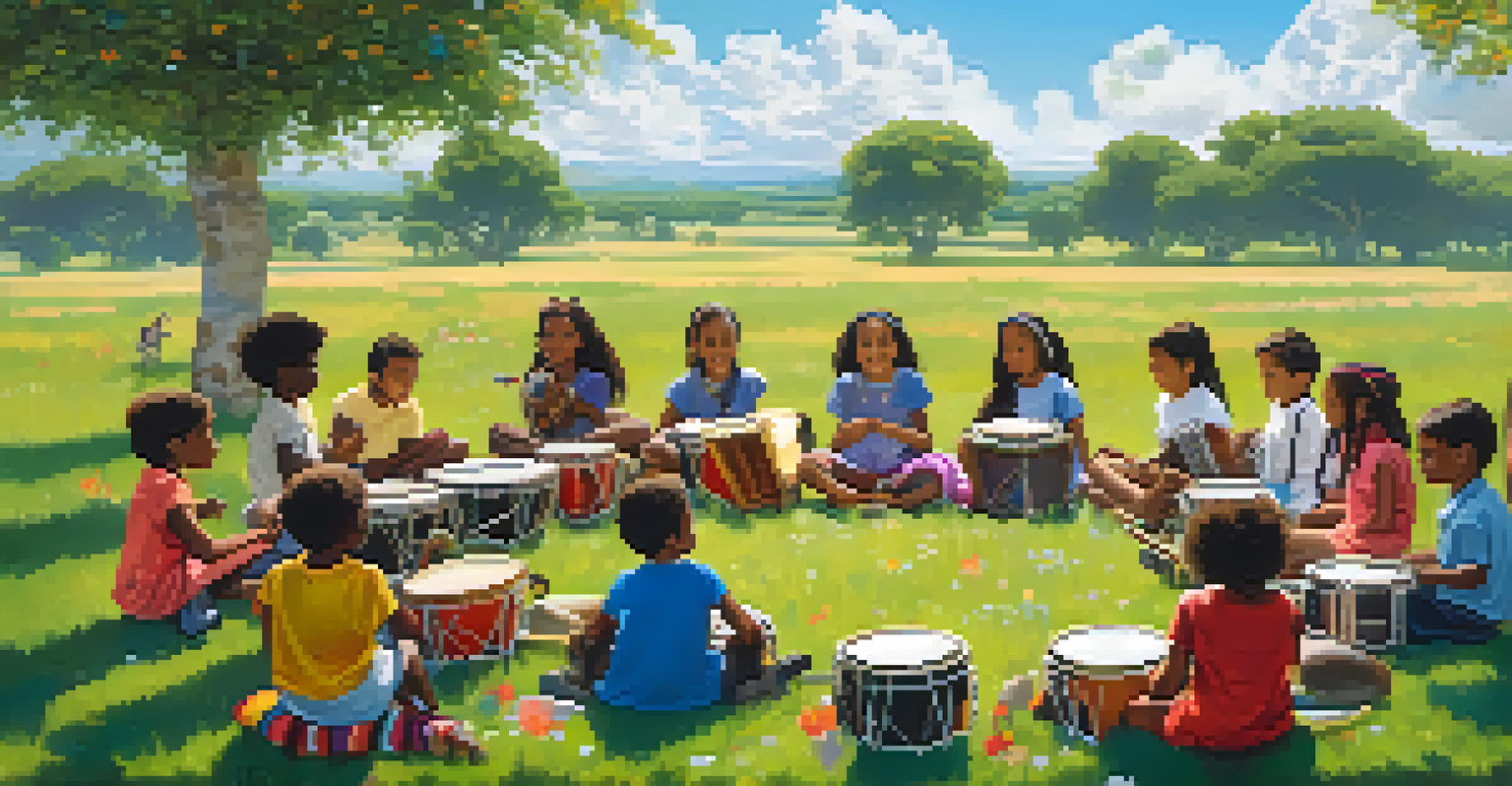The Role of Music in Cultivating Empathy in Young Children

Understanding Empathy: What Is It and Why It Matters
Empathy is the ability to understand and share the feelings of others. For young children, developing empathy is crucial as it lays the foundation for healthy relationships and social interactions. It helps them navigate their emotions and understand the perspectives of their peers, ultimately fostering a kinder environment.
Music can change the world because it can change people.
When children learn to empathize, they become more compassionate and supportive friends. This skill not only enhances their emotional intelligence but also enriches their social experiences. As they grow, those who have developed empathy are often better equipped to handle conflicts and build strong, meaningful connections.
Music plays a unique role in nurturing empathy, offering a universal language that transcends barriers. By engaging with music, children can explore emotions and develop a deeper understanding of themselves and others, making it a powerful tool in their emotional development.
The Emotional Power of Music: Connecting Hearts and Minds
Music has a remarkable ability to evoke emotions—think about how a sad song can make us tear up or how an upbeat tune can lift our spirits. For children, engaging with various musical genres allows them to experience a range of emotions, helping them recognize and articulate their own feelings. This emotional exploration is essential in cultivating empathy.

When children listen to music or participate in musical activities, they often find themselves connecting with the emotions expressed by the artists. This connection fosters a sense of shared experience, allowing children to step into someone else's shoes and understand their feelings. It’s a beautiful way for them to learn that emotions are universal, regardless of background or circumstance.
Empathy Starts in Childhood
Developing empathy in young children is crucial for building healthy relationships and emotional intelligence.
Moreover, the act of creating music together, whether through singing or playing instruments, can strengthen social bonds. Children learn to listen to one another, collaborate, and communicate effectively, all of which are vital components of empathy. In this way, music serves as both a mirror and a bridge, reflecting feelings and connecting hearts.
Storytelling Through Music: Lessons on Perspective
Many songs tell powerful stories that explore various experiences and emotions, offering children a glimpse into different lives. These narratives can introduce them to situations far removed from their own, expanding their understanding of the world. By listening to these stories, children can learn to appreciate diverse perspectives and the complexities of human experiences.
Empathy is about finding echoes of another person in yourself.
For instance, a song about friendship may highlight the joys and challenges that come with building relationships, teaching children about empathy and compromise. Similarly, a song focused on loss can help them understand grief and the importance of supporting one another during tough times. Through these musical stories, children can engage with emotions in a safe and relatable way.
This form of storytelling through music encourages conversations about feelings, allowing children to express their thoughts and ask questions. As they navigate these discussions, they not only learn about empathy but also develop critical thinking skills. This process helps them internalize valuable lessons about compassion and understanding.
Music Education: A Practical Approach to Empathy Building
Incorporating music education in early childhood programs can be an effective strategy for fostering empathy. By integrating music into the curriculum, educators can create opportunities for children to explore emotions, collaborate on projects, and engage in discussions about feelings. This hands-on approach allows children to practice empathy in real-time, enhancing their interpersonal skills.
Activities like group singing, instrument playing, and rhythm exercises not only teach musical skills but also encourage teamwork and communication. Children learn to listen to one another, respect different opinions, and work together towards a common goal. These experiences are invaluable in shaping empathetic individuals who value collaboration and community.
Music Enhances Emotional Understanding
Engaging with music allows children to explore emotions, fostering empathy through shared experiences.
Furthermore, music education can also expose children to various cultures, broadening their understanding of diversity. By exploring music from different backgrounds, they can appreciate the rich tapestry of human experiences, which in turn fosters a sense of empathy for those who may be different from themselves.
Music Therapy: A Specialized Tool for Developing Empathy
Music therapy has emerged as a powerful tool for promoting emotional well-being in children, particularly those facing challenges like trauma, anxiety, or social difficulties. Certified music therapists use music to help children express their emotions, process their experiences, and learn coping strategies. This therapeutic approach can significantly enhance their ability to empathize with others.
In a music therapy setting, children may engage in songwriting, improvisation, or structured musical activities that encourage emotional expression. Through these activities, they learn to articulate their feelings and understand the emotions of others. It’s an effective way to create a safe space where they can explore their inner world while developing empathy.
Additionally, music therapy can facilitate communication skills, especially for children with speech or social challenges. By using music as a medium, they can connect with peers and therapists in ways that might be difficult through traditional verbal communication. This connection lays the groundwork for empathetic interactions and strengthens their social skills.
Parental Involvement: Encouraging Musical Bonds at Home
Parents play a crucial role in nurturing empathy through music by creating a musical environment at home. Simple activities, like playing music during family time, singing together, or even dancing can help children connect emotionally with their family members. These shared experiences foster bonding and promote a sense of belonging—key elements in developing empathy.
Encouraging children to express their feelings about music can also be beneficial. Ask them how certain songs make them feel or what stories they think the lyrics tell. These conversations can lead to deeper discussions about emotions, helping children articulate their feelings and understand the emotional experiences of others.
Parent Involvement Boosts Empathy
Parents can nurture empathy at home by creating musical environments and encouraging emotional discussions.
Moreover, parents can introduce their children to diverse musical genres and cultures, broadening their horizons. By exposing them to different musical styles and the stories behind them, parents can help cultivate a sense of appreciation for diversity, which is essential in nurturing empathetic individuals.
The Lasting Impact of Music on Empathy Development
As children grow and develop, the empathy they cultivate through music can have a profound impact on their lives. Studies suggest that individuals who engage with music are often more socially aware and emotionally intelligent. These skills can serve them well into adulthood, enhancing their relationships and professional interactions.
Additionally, the lessons learned through music—such as understanding different perspectives and expressing emotions—can translate into other areas of their lives. Whether in friendships, family dynamics, or workplace interactions, the ability to empathize fosters a more harmonious environment, leading to healthier relationships overall.

Ultimately, the role of music in cultivating empathy is a beautiful and powerful one. By integrating music into the lives of young children, we not only enrich their emotional experiences but also equip them with the essential skills needed to navigate the complexities of human connections throughout their lives.